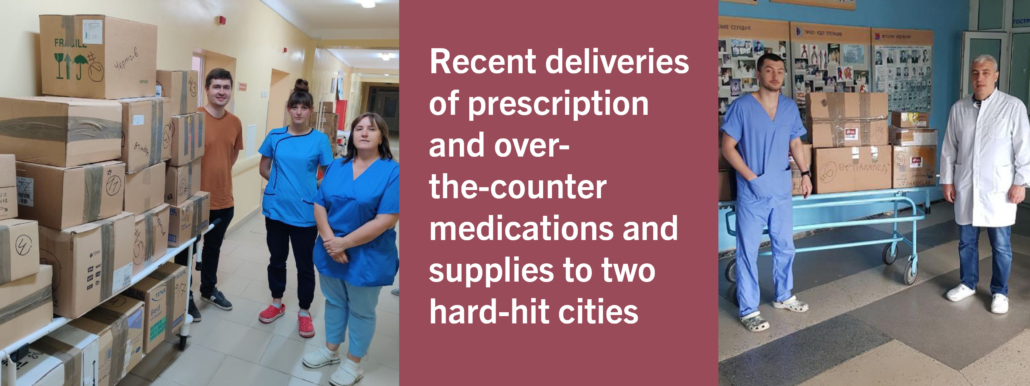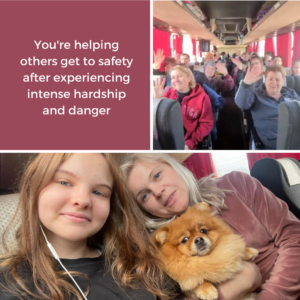Your contributions continue to save Ukrainians through a responsive grassroots network!
Here’s an update on your impact.
We’ll update this page regularly.
You have joined more than 360 funders. Your generosity powers a tenacious grassroots network that, with each infusion of funds, delivered food and medicine to those who could not leave, and evacuated the most frail and vulnerable people from the most dangerous and surrounded places.
You’re Saving Lives
Every dollar has enabled this network to take their system to scale and accelerate evacuations, making them uniquely able to access cities that other rescue efforts cannot.
With your contributions:
- 4,630 women, children, and Holocaust survivors were evacuated from Kherson, Mykolaiv, Mariupol, Kharkiv, Chernihiv, Dnipro, Kryvi Rih, and surrounding areas.
- 392 pallets of food and 60 pallets of medicine and medical supplies were delivered to people who have been isolated and/or displaced, including Holocaust survivors.
- Provided sexual assault trauma kits, surgical tools, and cash transfers for safe evacuation and basic needs.
Needs are evolving in real time:
- Heat for the winter: access to water and power comes and goes, especially after missile and drone strikes; rolling blackouts are now the norm nationwide. Ukrainians need warming shelters, portable heaters and stoves, and charging for electrical devices.
- Trauma care: tens of millions of Ukrainians need trusted healthcare for mental and physical responses to months of trauma.
- Funds to purchase and distribute healthcare and medical supplies within Ukraine and Europe: it is more cost effective to streamline and localize sourcing of these materials.
Report on Jewish and Israeli Humanitarian Response in Ukraine
OLAM, a network of Jewish and Israeli organizations working in the fields of global service, international development, and humanitarian aid, commissioned a report about Jewish and Israeli agencies and networks’ efforts to support Ukraine and its people. Our staff was interviewed for the report and key leaders involved in the network gave testimonials about the role of this grassroots network. Read the full report, Unprecedented Response and Collaboration: Preliminary Lessons from Jewish and Israeli Responses to the Crisis in Ukraine, here.
How Funds Are Used
- Funds for food, medical supplies, prescription and other medicine, as well as rape and sexual assault treatment and kits especially for young girls and surgical tools are now the most pressing needs. We have lists of specific medicines and supplies that have been requested and which we have been able to access. The costs for these have soared because of widespread scarcity. More funds are much needed to continue to feed people and provide them with critical medical interventions.
- In dangerous cities where buses can still enter, 55-60 people can be evacuated to ensure they are stable and nourished for $6,000-$10,000. Cost depends on driver ability and willingness, infrastructure and more.
- In the most heavily bombarded cities where no one else will attempt evacuations, a convoy of several mini-buses can evacuate 40-60 people or more at a time for $25,000-$50,000. (Cost ranges from about $500 to more than $1,000 per person.)
- On a non-sectarian basis to those most in need.
- 100% of funds raised go to real-time critical needs – evacuation, food and medical supplies have been our top priorities. Now as we look to winter, priorities are shifting to heat and energy, as well as basic medical supplies. Every dollar has enabled this network to take their system to scale and accelerate impact, leveraging their on the ground knowledge to reach the most vulnerable.
Contact Us
- Please write to us at ukraine@impactcubed.org if you:
- Have requested donations from funds or foundations that may take time to arrive. We will let the team know in real time so they know they have the resources for more buses and supplies.
- Know potential partners to connect to our speakers, such as other organizations or individuals doing work on the ground.
- Have specific cases of possible evacuations to bring to our network’s attention.
- Have other resources to share.
Thank you! We will keep you informed about future briefings and updates.




